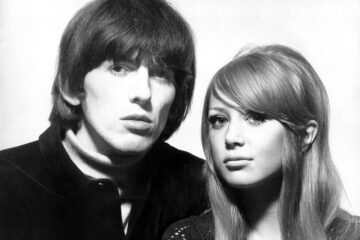To overstate the influence and achievements of The Rolling Stones would almost be a challenge: They’re the kind of cultural institution for which the phrase “needs no introduction” was invented. So it was a disarming moment when Keith Richards, having just been introduced by NPR’s Scott Simon as “one of the greatest guitarists in history,” offered this half-chuckled response: “Hey Scott. Thanks for the buildup, man.”
He has reason to sound happy: Alongside bandmates Mick Jagger and Ronnie Wood, Richards just released The Rolling Stones’ first album of original material in 18 years. Hackney Diamonds has been a surprise critical hit, especially for a band entering its seventh decade. It’s also a sendoff to drummer Charlie Watts, who died in 2021. (Watts does appear on several tracks; the rest are filled out rhythmically by the band’s longtime friend Steve Jordan.)
Richards spoke with Simon on Weekend Edition Saturday about where his energy and enthusiasm comes from after so many years making music, as well as the childhood origins of his creative relationship with Jagger. Hear their conversation at the audio link, and read an edited transcript below.
Scott Simon: Do The Rolling Stones never look at each other and say, “You know, we really could just put our feet up and sit under the sun in Monaco or something”?
Keith Richards: We can put our feet up for a little bit, but you know. You’re into this thing all the way. This is what we do. We’ve gotta see this Rolling Stones through.
Tell me how this new album comes about, after a number of years.
I wish I could explain the ins and outs. Last year we were on the road, and Mick looked at me: “Look, we’ve got to blitz a record here. We’ve got to push it through and say, ‘Here we are.’ ” I still don’t believe we cut a record that quick, but it was a great feeling.
What was it like to … well, to not work with Charlie Watts, after all this time?
As part of the Stones, it was difficult. Made much easier by Mr. Watts himself, who had always recommended Steve Jordan: “If anything happens, Steve Jordan’s the man.” That advice came many years ago to me, and that caused me to work on The X-Pensive Winos with Steve Jordan. So it was a natural fold-in for the events, but at the same time, I do know that it is with Charlie’s blessing — which makes us all a lot happy, you know?
“Hackney diamonds” is a British phrase, right? For what?
A hackney diamond is like a really good Saturday night that went bad. So it’s what’s left on Sunday morning — the broken glass and stuff. That’s basically it.
I’ve never heard this story from you: You went to grade school with Mick Jagger?
Oh, yeah! Mick and I were at school together from about the age of 5 until 10.
I’m assuming you didn’t play music together then?
Not then, no. We used to play around together; we knew each other well. Mick was very, very bright, and I was very dumb. So Mick went into grammar schools, and I went to a technical school. I needed to learn a few things. And then we re-met during that period just after school and found out that we, surprisingly enough, not only knew each other, but that we both loved the same music and were both passionate about it. And that’s the Stones, baby.
Because what I’ve read and heard over the years is that you met on a train platform, and one of you was carrying a Chess Records album.
Almost right. It so happened that we used to take the same train. I was going to art school and Mick was going to the London School of Economics. You believe this?
Yes, of course. You said he was smart.
Yeah, but this is the truth! We got into the same carriage together and I looked at what he was carrying, which was two albums: One was The Best of Muddy Waters, and the other was Rockin’ at the Hops by Chuck Berry. I had never seen anybody possessing such treasures in my life — because these were, you know, Chess Records out of Chicago.
And what was it about that music?
It was real. At our age, being, like, war babies and everything, I guess it was … there was no showbiz about it. It was the stuff. You felt that you were listening to something that is rather deeper than most people were listening to. And the blues is about as deep as you can get.
We were in an apartment, and we had our first gig. One of us — I think it was Brian Jones — was on the phone saying we wanted to place an advert. And they said, “What are you called? Do you have a name?” Oh God, we haven’t got a name! And on the floor was that same album, and on the back, the first track was “Rollin’ Stone.”
Oh my God.
Phone call’s costing money. We’re The Rolling Stones.
I covered Muddy Waters’ funeral, by the way. He loved you, you know.
Oh, I know that. I did once fall asleep at Muddy’s house and woke up at Howlin’ Wolf’s. Don’t ask me how.
Do you dream music?
No. Except, well … with “Satisfaction,” I had just got a cassette player; it was a new thing then. I put it beside the bed. I fell asleep, as I did occasionally. And when I woke up in the morning, I realized that the tape had run from the beginning to the end. Obviously, I had woken up in the middle of the night, pushed the buttons and just played that phrase: “I can’t get no / Sat-is-fac-tion” [mimics guitar riff]. And then the rest of the tape is me snoring.
You still enjoy performing, it sounds like.
Yeah man, I love it. It keeps me on my toes and keeps my fingers moving. And I’m still finding different ways of playing things. Even though you’re getting to be around 80, believe me, it don’t stop.
Can those of us on the outside imagine what it’s like to be Keith Richards and The Rolling Stones?
I have no idea what they can imagine. I am who I am, I’ve got my folks, and I’ve still got my band, man. I’ve got a band that’s lasted longer than anybody else’s in the damn world.
So there’s another album in the pipeline?
Whoa, you’re really pushing! There’s plenty more stuff left over from Hackney Diamonds to work on. There’ll always be another one until we drop.



